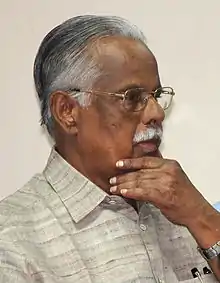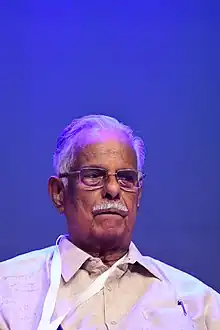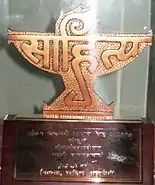T. Padmanabhan
Thinakkal Padmanabhan (born 5 February 1931), popularly known as T. Padmanabhan, is an Indian short story writer of Malayalam literature. He is a recipient of several awards including the Ezhuthachan Puraskaram, the highest literary award of the Government of Kerala. He declined some of the earlier awards he was selected for which include Kerala Sahitya Akademi Award (1973), Odakkuzhal Award (1995) and Sahitya Akademi Award (1996). Mahatma Gandhi University conferred on him the honoris causa degree of the Doctor of Letters in 2018. [1][2][3]
T. Padmanabhan | |
|---|---|
 | |
| Born | 5 February 1931 Pallikunnu, Malabar District, Madras Presidency, British India (present day Kannur, Kerala, India) |
| Occupation | Short story writer |
| Nationality | Indian |
| Years active | 1950–present |
| Notable works | Prakasam Parathunna Oru Penkutty, Gowri, Kadal, Thiranjedutha Kathakal |
| Notable awards |
|
| Spouse | Kallanmarthodi Bharghavi |
Biography
T. Padmanabhan was born on 5 February 1931[4] in a family of poor financial means at Pallikunnu near Kannur, in the south Indian state of Kerala to Puthiyidath Krishnan Nair and Devaki (Ammukutty) as the youngest of their four children.[5] His father died when he was only a few months old and it was his mother and the eldest brother who looked after him during his childhood.[6] He completed his school education from Chirakkal Raja's High School, and did his college studies at Mangalore Government Arts College, before graduating in law from Madras Law College (now known as Dr. Ambedkar Government Law College, Chennai) to start his practice in Thalassery and Kannur courts.[7] By this time, he had already established himself as a budding writer and M. K. K. Nair, a known arts enthusiast and the then chairman and managing director of FACT,[8] invited him to join the company. Padmanabhan served FACT in different capacities including that of the head of Materials Division to superannuate from service as its Deputy general manager in 1989[9] during which time he had a number of legal tussles with the company after M. K. K. Nair left FACT in 1971.[10]
Padmanabhan was married to Kallanmarthodi Bharghavi[9] who died in 2014 and the couple had no children.[4] He lives a retired life in Kannur.[10] His major works include Prakasham Parathunna Oru Penkutty, Oru Kathakrithu Kurishil, Makhan Singhinte Maranam, Veedu Nashtapetta Kutti, Kalabhariavan, Nalinakanthi, Sakshi, Sayvinte Naya, Gouri and Kadal.
Legacy
What appeals most to his readers in all his early and recent stories is the lyrical quality of the language and the aesthetics of his perceptions, especially in the portrayal of loneliness and helplessness, writes K. Ayyappa Panicker, about T. Padmanabhan, in his book A Short History of Malayalam Literature.[11]
Padmanabhan started writing at the age of 19[12] and has written over 190 short stories[5] of which Prakasam Parathunna Oru Penkutty (The Girl Who Spreads Radiance, 1955), Oru Kathakrithu Kurishil (A Story Writer being Crucified, 1956), Makhan Singhinte Maranam (The Death of Makhan Singh, 1958), Kala Bhairavan, Gouri (1993) and Maraya (2017)[13][14][15] are some of his major works.[16] He has also written a book, Ente Katha, Ente Jeevitha (My Story, My Life)[17] which is a compilation of some of his essays and articles, an interview and an afterword by Pinarayi Vijayan.[18]

Padmanabhan, whose stories have been translated in almost every Indian languages[9] and foreign languages such as Russian, French and English.[19] has been credited with bringing the modern Malayalam short story nearer to the subjective intensity of the lyric.[20] His stories are known to have emerged, portraying an individualistic idiom, when Malayalam literature was rife with repeated depiction of romantic idealism and social commitment.[21]
His short story "Gauri" was adapted into a musical and was broadcast by Doordarshan in 1992;[22] the story was also made into a film the same year by Kaviyoor Sivaprasad.[23] Another of his stories, Gaadha, was taken up by the award-winning director/cinematographer, Shaji N. Karun, in 2016 but the film was never released.[24]
Awards and honours
Towards the early days of his career, Padmanabhan made it almost a habit of declining awards; when his story, Saakshi was chosen for the Kerala Sahitya Akademi Award for Story in 1973, he declined it.[25][26] More than two decades later, the 1995 Odakkuzhal Award for his story, Kadal was also rejected[27] followed by another rejection a year later, the Kendra Sahitya Akademi Award of 1966 for Gowry.[28] He received the Lalithambika Andharjanam Award in 1998[29] and the Vayalar Award of 2001 for Puzha Kadannu Marangalude Edayileku.[19][30] He received one more award in 2001, the Vallathol Award,[31] The government of Kerala honoured him with their highest literary award, the Ezhuthachan Award in 2003[20] and he was selected for the Muttathu Varkey Award in 2007.[32] The Kerala Sahitya Akademi inducted him as their distinguished fellow in 2012[33] and he received two awards in 2014, the C. V. Kunhuraman Literary Prize[34] and the Bharatiya Bhasha Parishad Award.[35] He was awarded the Mathrubhumi Sahitya Puraskaram in 2015,[27][36] and the Abu Dhabi Sakthi-T. K. Ramakrishnan Award in 2019.[37] Mahatma Gandhi University conferred him with an honorary doctorate in 2018.[3]
Bibliography
Short stories
- Padmanabhan, T. (1988). Nalinakanthi. Kottayam: DC Books. ISBN 9788171302338.
- Padmanabhan, T. (2010). Gulmohammed. Kottayam: D C Books. ISBN 9788126400379.
- Padmanabhan, T. (2008). Pallikunnu. Kottayam: D C Books.
- Padmanabhan, T. (2007). Ente Priyappetta Kathakal (5th ed.). Kottayam: D. C. Books. ISBN 9788126406005.
- Padmanabhan, T. (2002). Budha Darshanam. Kollam: Sankeerthanam publications.
- Padmanabhan, T. (1995). Padmanabhante Kathakal. Kottayam: D.C. Books. ISBN 9788126405275.
- Padmanabhan, T. (1986). Kaalabhairavan. Kottayam: D.C. Books.
- Padmanabhan, T. (1982). Sahrudayanaaya Oru Cheruppakkarante Jeevithaththil Ninnu. Kottayam: Sahitya Pravarthaka Sahakarana Sangam.
- Padmanabhan, T. (1971). T. Padmanabante Thiranjedutha Kathakal. Thrissur: Current Books.
- Padmanabhan T (1999). Ente Adyathe Kathakal (3rd ed.). Calicut: P.K. Brothers.
- Padmanabhan, T. (2016). Apoorvaragam (2nd ed.). Kozhikode: Mathrubhumi Books. ISBN 9788182668294.
- Padmanabhan, T. Katha Theerumpol Oru Vanampati Parakkunnu. Malabari.
- Padmanabhan, T. Iruttum Mumpe.
- Padmanabhan, T. (2014). Ningale Enikkariyam. Kottayam: D. C. Books. ISBN 9788126452392.
- Padmanabhan, T. (2012). Puzha Katannu Marangalude Idayilekku. Kottayam: D C Books.
- Padmanabhan, T. (2002). T. Padmanabhante Kathakal Sampoornam. Kottayam: DC books. ISBN 9788126405275.
- Padmanabhan, T. (2004). Ningale Enikkariyam. Kottayam: DC books. ISBN 9788126452392.
- Padmanabhan T (1999). Kalavarsham. Pappiyon, Kozhikode: Pappiyon, Kozhikode.
- Padmanabhan. T (1956). Oru Kadhakruthu Kurisil. P.K.Brothers: P.K.Brothers.
- Padmanabhan. T (1958). Makhasinginde Maranam. New Delhi Asian Educational services.
- Padmanabhan T (1999). Athu Christuvayirunnu. Mulbery, Calicut: Mulbery, Calicut.
- Padmanabhan T (1991). Gouri. D.C Books: D.C Books.
- Padmanabhan, T. (1955). Prakasham Parathunna Oru Penkutty. Kottayam: Sahitya Pravarthaka Co-operative Society.
- Padmanabhan, T. (1994). Kadal. Kottayam: D. C. Books.
- Padmanabhan, T. (2014). Padmanabhante Kuttikal (2nd ed.). Kannur: Alfane Publishers pvt.ltd. ISBN 9789382507352.
- Padmanabhan, T. (1973). Saakshi. Kottayam, SPCS.
{{cite book}}: CS1 maint: location missing publisher (link) - Padmanabhan, T. (1979). Harrison Saayvinte Naaya.
- Padmanabhan, T. (1983). Veedu Nashtapetta Oru Kutty.
- Padmanabhan, T. (2018). Maraya. DC Books. ISBN 9788126476954.
Memoirs
- Padmanabhan, T. (2015). Ente Katha Ente Jeevitham. Kozhikode: Olive Books. ISBN 9789385269004.
- Padmanabhan, T. (2010). Kathakalkkidayil. Kottayam: D.C.Books. ISBN 9788126427376.
Translations
- Padmanabhan T. Fifteen stories. Translated by Prema Jayakumar. Tharjuma book point.
References
- "MG University D.Litt notification" (PDF). www.mgu.ac.in. 8 August 2018. Retrieved 11 April 2019.
- "Mahatma Gandhi University Honorary Doctorate for M.A. Yusuff Ali". www.emiratespr.com. 12 February 2018. Retrieved 11 April 2019.
- "Mahatma Gandhi University honours T Padmanabhan, MA Yusuff Ali". Deccan Chronicle. 14 December 2018. Retrieved 11 April 2019.
- Terms UP Malayalam (6 April 2016). "T Padmanabhan – a documentary". YouTube. Archived from the original on 19 December 2021. Retrieved 13 April 2019.
- "ടി പത്മനാഭന്...മലയാള കഥയുടെ കുലപതി". Deshabhimani (in Malayalam). Retrieved 13 April 2019.
- MediaoneTV Live (15 September 2013). "T.Padmanabhan-Prakasham Parathunna Ezhuthukaran". YouTube. Archived from the original on 19 December 2021. Retrieved 13 April 2019.
- "കഥയുടെ എഴുത്തച്ഛൻ". ManoramaOnline. Retrieved 13 April 2019.
- "Biography of Eminent Nairs". www.nairs.in. Retrieved 13 April 2019.
- "T. Padmanabhan – a Lifesketch". Mathrubhumi. Retrieved 13 April 2019.
- sharulfilms (21 November 2013). "Kannur Peruma – T PADMANABHAN". YouTube. Retrieved 13 April 2019.
- K. Ayyappa Panicker (November 1977). A Short History of Malayalam Literature. Information & Public Relations Department, Kerala State. pp. 114–115.
- 60years of writing on YouTube
- "അധരസിന്ദൂരം കൊണ്ടെഴുതിയ 'മരയ'". ManoramaOnline. Retrieved 13 April 2019.
- ഡെസ്ക്, ന്യൂസ് (21 July 2017). "'മരയ' ചരിത്രം കുറിക്കുന്നു". Retrieved 13 April 2019.
- "മരയ: ലാവണ്യത്തിന്റെ മയൂരനൃത്തമില്ലാതെ". ജന്മഭൂമി - Janmabhumi Daily. 15 May 2017. Retrieved 13 April 2019.
- "Authors and their works". archive.is. 9 December 2012. Archived from the original on 9 December 2012. Retrieved 13 April 2019.
- Padmanabhan, T. (2015). Ente katha ente jeevitham (in Malayalam). ISBN 9789385269004.
- Padmanabhan, T. (2015). "Ente Katha Ente Jeevitham – profile" (in Malayalam). Olive Publications. Retrieved 13 April 2019.
- "DC Books-T. Padmanabhan". onlinestore.dcbooks.com. Retrieved 13 April 2019.
- "Ezhuthachan award for T. Padmanabhan". The Hindu. 2 November 2003. Retrieved 13 April 2019.
- "Seasons India :: Malayalam Literature of India". www.seasonsindia.com. Retrieved 13 April 2019.
- "T. Padmanabhan – Veethi profile". veethi.com. Retrieved 13 April 2019.
- "Gouri [1992]". malayalasangeetham.info. Retrieved 13 April 2019.
- "Gaadha [2016]". malayalasangeetham.info. Retrieved 13 April 2019.
- V Abdulla (20 September 2004). Wind Flowers: Contemporary Malayalam Short Fiction. Penguin Books Limited. pp. 221–. ISBN 978-93-5214-185-2.
- Mohan Lal (1992). Encyclopaedia of Indian Literature: Sasay to Zorgot. Sahitya Akademi. pp. 4057–. ISBN 978-81-260-1221-3.
- "Mathrubhumi Award for T Padmanabhan". Mathrubhumi. 7 September 2015. Retrieved 13 April 2019.
- "In search of the perfect story". The Hindu. 25 May 2003. Retrieved 13 April 2019.
- "Lalithambika Antharjanam Smaraka Sahitya Award". www.keralaculture.org. 13 April 2019. Retrieved 13 April 2019.
- "Winners of Vayalar Award". www.keralaculture.org. 13 April 2019. Retrieved 13 April 2019.
- "Winners of Vallathol Literary Awards". www.keralaculture.org. 13 April 2019. Retrieved 13 April 2019.
- "Muttathu Varkey award presented to Padmanabhan". The Hindu. 29 May 2007. Retrieved 13 April 2019.
- "Kerala Sahitya Akademi Fellowship". www.keralaculture.org. 13 April 2019. Retrieved 13 April 2019.
- "Literary Award for T Padmanabhan". The New Indian Express. Retrieved 13 April 2019.
- "Mathrubhumi Literary award given to T Padmanabhan". Mathrubhumi. Retrieved 13 April 2019.
- "Mathrubhumi Literary Award". www.keralaculture.org. 13 April 2019. Retrieved 13 April 2019.
- "അബുദാബി ശക്തി തായാട്ട് അവാര്ഡുകള് പ്രഖ്യാപിച്ചു; ടി പദ്മനാഭന് ടി കെ രാമകൃഷ്ണന് പുരസ്കാരം". Deshabhimani. 18 May 2021. Retrieved 3 January 2023.
External links
- "Padmanabhan T. – Author Profile". www.goodreads.com. Retrieved 13 April 2019.
- Interview on Indiavision on YouTube
- Interview on MediaOne Part 1 on YouTube
- Interview on MediaOne Part 2 on YouTube
- Reminiscences on YouTube
- Speech on YouTube
